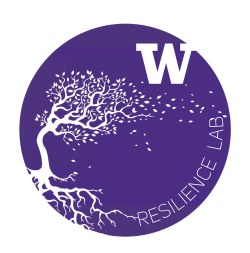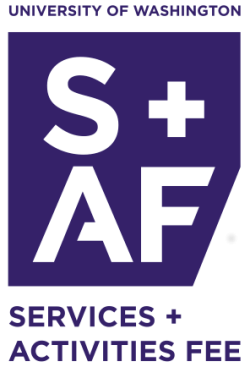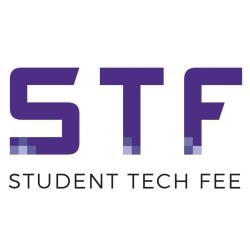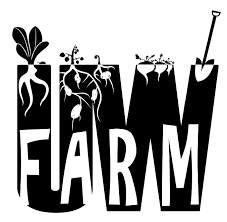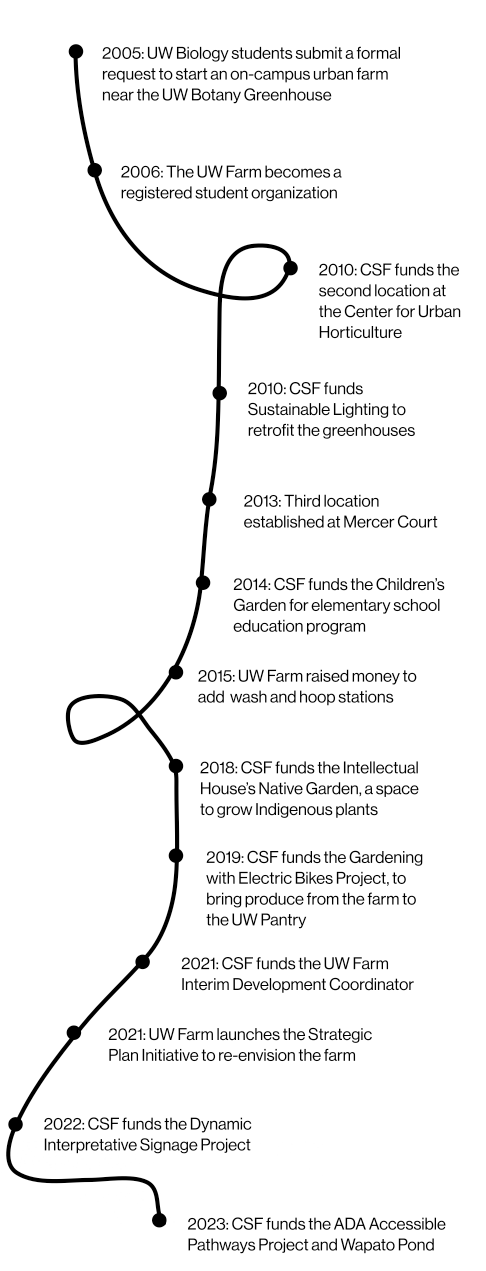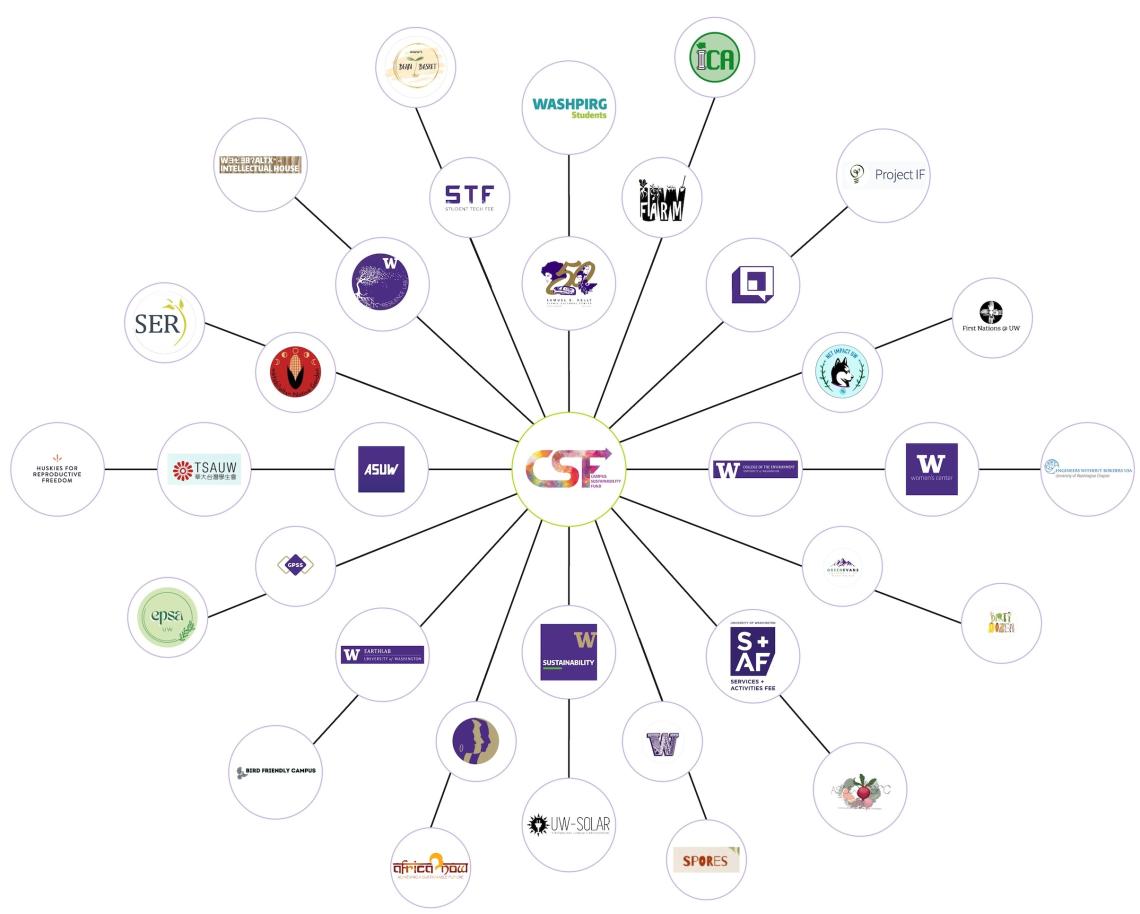
Click on image to enlarge.
The Campus Sustainability Fund (CSF) nurtures a deep network of partners across campus, furthering our collective impact for a more sustainable UW. Read more about each partner, our collaborations across silos, and how we are expanding the understanding of sustainability below! Our network is continually growing -- we hope you join.
The Vision of the Women’s Center is to be a vital place where women and men collaborate to build a culture of gender equity campus-wide, locally, and globally. The UW Alene Moris Women’s Center is a catalyst for change. We disrupt cycles of oppression and break down gender-based barriers through transformational education programs, leadership development, and advocacy for girls, women, and people of all gender identities. We believe women’s rights are human rights.
Partnership
Leadership Academy: Emerging Leaders Program
The Associated Students of the University of Washington (ASUW) is the student government and democratic voice of the campus community. Through programming, services, and advocacy, ASUW fosters a safe, inclusive environment, enriches student life, and develops future leaders. Elected representatives, hired employees, and volunteers work together to ensure that students succeed, flourish, and enjoy their college experience.
Partnership
- ASUW Board of Directors.
- Bean Basket, ASUW Student Food Co-op, Humble Feast.
- Joint Commissions Committee to further equity initiatives on campus.
The College of the Environment envisions a just and sustainable future where research informs education and supports a thriving, resilient Earth and its inhabitants. It advances understanding of the natural world and humanity’s role within it, creating equitable solutions to environmental challenges while educating future generations to address these issues. Guided by core values of collaboration, collegiality, inclusion, integrity, stewardship, and discovery, the College fosters a culture of respect, ethical behavior, and shared responsibility for the Earth and its communities.
Partnership
CoE Senior glass gift
The CSF was conceptualized within the College of the Environment, gaining footing among PoE students between 2004-2009 in our campaign.
An equitable, just and sustainable world where people and planet thrive. EarthLab’s mission is to push boundaries to develop innovative, just and equitable solutions to environmental challenges and climate action. We do this by connecting across sectors and academic disciplines to inspire and incentivize new partnerships that bridge the UW and the wider community.
Partnership
- CSF and EarthLab work to empower the youth entering the environmental justice and climate justice movements.
- EarthLab Summer Internship Program.
The UW Environmental Stewardship Committee (ESC) provides tri-campus institutional leadership coordination over the development of the university’s Sustainability Action Plan, climate and sustainability goals, and associated policies.
Partnership
The Kelly ECC is an inclusive and affirming space that cultivates a transformative student experience. We serve and empower historically marginalized and underrepresented students by providing educational and cultural opportunities for holistic development. We aim to foster cultural enrichment and equity for our intersectional community in order to create social change at UW and beyond.
Partnership
- Diversity leadership conference.
- Student organizations.
- Efforts to build culturally-affirming spaces.
The Graduate and Professional Student Senate (GPSS) represents the rights and interests of over 15,000 graduate and professional students at the University of Washington. Our Senators, representing diverse academic departments and non-academic communities, advocate for students at the university, state, and federal levels. GPSS also hosts events, provides funding for academic and professional development, and offers engagement opportunities through internal committees and liaison positions.
Partnership
wǝɫǝbʔaltxʷ – Intellectual House is a longhouse-style facility on the UW Seattle campus. It provides a multi-service learning and gathering space for American Indian and Alaska Native students, faculty and staff, as well as others from various cultures and communities to come together in a welcoming environment to share knowledge. When it opened its doors for the first time in 2015, the Intellectual House made history. The building was the culmination of a decades-long dream to create a gathering place in honor of our region’s First Nations. An iconic structure on the University of Washington campus, the Intellectual House has been home to many tribal summits and events, and it has been the site of many other university and community events.
Partnership
The Office of Minority Affairs & Diversity creates pathways for diverse populations to access postsecondary opportunities, nurture and support their academic success, and cultivate a campus climate that enriches the educational experience for all. OMA&D fosters a welcoming university environment, broadens college access across Washington, and supports the academic success of thousands of UW students. It awards scholarships, promotes diversity, and introduces students to graduate studies, while also engaging with alumni and diverse communities to develop future leaders and mentors.
Partnership
To facilitate and enhance a brave, affirming, liberatory, and celebratory environment for students, faculty, staff, and alumni for all sexual and gender orientations, identities, and expressions.
Partnership
The Menstruation Station, focuses on supporting queer and trans UW students through menstrual and environmental justice. Launched by UW graduate Joie Waxler, the program provides free menstrual products, aiming to reduce the financial and emotional burdens of menstruation. The CSF supported this program with $1000 in FY2021 and $3,000 annually for three years (FY24-26) to sustain this essential initiatives of the program.
EnGender, created from student feedback, offers free gender-affirming items such as binders, gaffs, packers, and makeup, along with personalized consultations. After receiving funding from the CSF and UW Resilience Lab in 2023-24, the program has been highly successful, and CSF funding will continue through FY27.
The Resilience Lab promotes well-being through research, education, and strategic initiatives aimed at cultivating a compassionate community. They support students in becoming change-makers, provide tools and training to help students, staff, and instructors manage stress and build self-awareness, and advocate for policies that foster a resilient, inclusive campus culture.
Partnership
The CSF and the UW Resilience Lab collaborate on the Resilience and Compassion Seed Grant every spring. Together we award funds to students, faculty, and staff on the Tri-Campus who aim to promote a resilient, compassionate, and inclusive campus culture through systems change.
Grants were capped at $3,000 from 2018-2021 and increased to $5,000 in 2022.
Explore funded projects on our project viewer page.
The CSF regularly seeks Registered Student Organizations as key collaborators in our mission to equip students with the skills to become connectors across silos, project leaders of climate solutions, and narrative-changers championing justice-centered sustainability. Below are some of the RSOs we currently collaborate with and have partnered with over the years:
The Services and Activities Fee is a student levied, student distributed fee to support and enhance the out of class experience of students at the University of Washington Seattle. The Services and Activities Fee provides ongoing operational and capital funding for programs, which protect and enrich the cultural, emotional, intellectual, physical, and social well being of the student.
Partnership
- SAF is the primary funder of the CSF.
- The CSF became a SAF funded unit in 2010 with a budget of $339,805.
- The yearly award has fluctuated slightly over the years but remains around $400,000.
The UW – Seattle Student Technology Fee provides students and university departments with the funding to make their technology-related programs and projects a reality. Simply put, we are a group of students committed to supporting students’ research, communities, and services by providing awards big and small.
Partnership
- Since the 2016–2017 academic year, the Campus Sustainability Fund (CSF) and the Student Technology Fee (STF) have worked in close partnership to support student-led projects at the intersection of sustainability and technology.
- During this academic year CSF sought STF support on five projects for a total of $48,700.
- In January 2018, the CSF presented a funding proposal to the STF Committee (STFC) to receive the status of a “special project,” which was approved with a full allocation of $200,000 for the 2017-2018 academic year.
- What began with five ad-hoc project grants evolved into an annual $200,000 block award, leading to the successful funding of impactful initiatives around campus and also offered students hands-on experience with project management, design, and implementation.
- Three key projects include the Life Sciences Building, Population Health Building, and Health Sciences Education Building.
- Students worked with UW Solar and partners to integrate solar technology into the Life Sciences Building.
- The Population Health Building features a rainwater catchment system with public education displays.
- In the Health Sciences Education Building, students helped implement an electrochromic glazing system, enhancing classroom environments and advancing energy performance in collaboration with faculty and industry professionals.
- Three key projects include the Life Sciences Building, Population Health Building, and Health Sciences Education Building.
- With COVID and the UW financial transformation funding paused from 2020/21 to 2023/24.
- In the 2024–2025 academic year, the block award was canceled. We are currently in communication with STF to explore new pathways for collaboration that best support student projects addressing sustainability and technology across campus.
- To explore these grants navigate to our project portfolio page and filter the category to Student Technology Fee (STF).
The UW Farm is a 1.5-acre student-powered urban farm on the Seattle campus, serving as the university's hub for urban agriculture and sustainability. Its mission is to be an educational and community-oriented resource for those interested in building productive and sustainable urban landscapes.
Partnership
- The UW Farm expansion was the inaugural CSF project, funded at $80k. This brought the farm, a mostly educational 1/3 acre property at the Plant Laboratory Building, to its version of a one acre urban farm at the Center for Urban Horticulture (CUH) that could feed campus through HFS.
- The vote was unanimous and demonstrated the marriage between environmental and social sustainability.
- The CSF has been a continuous funder of the UW Farm throughout the last 14 years supporting projects including:
Text alternative to timeline
2005: UW Biology students submit a formal request to start an on-campus urban farm near the UW Botany Greenhouse
2006: The UW Farm becomes a registered student organization
2010: CSF funds the second location at the Center for Urban Horticulture
2010: Sustainable Lighting to retrofit the greenhouses
2013: Third location established at Mercer Court
2014: CSF funds the Children's Garden elementary school education program
2015: UW Farm raised money to add wash and hoop stations
2018: CSF funds the Intellectual House's Native Garden a space to grow Indigenous plants
2019: CSF funds the Gardening with Electric Bikes Project, to bring produce from the farm to the UW Pantry
2021: CSF funds the UW Farm Interim Development Coordinator
2021: UW Farm launches the Strategic Plan Initiative to re-envision the farm
2022: CSF funds the Dynamic Interpretative Signage Project
2023: CSF funds the Accessible Pathways Project and Wapato Pond
The focus of the UW Sustainability Office is to integrate sustainability into every aspect of university life, including scholarship, service, operations, public health, and community. By embedding sustainability in UW culture, UWS strives to take bold, urgent actions for a just, resilient, and healthy planet. UWS acknowledges past and present environmental harm and inequity to make meaningful progress.
UWS’ goal is to develop leaders and innovative solutions to address global climate and sustainability challenges through teaching, research, service, and operations. At UW, we define sustainability as the capacity to create and maintain healthy, equitable, and diverse communities and ecosystems, involving an understanding of the interdependence of all life on Earth, recognizing the impacts of human activity, and committing to collective wisdom and deliberate action.
Partnership
In 2010 the CSF selected the UW Office of Environmental Stewardship & Sustainability Department (now renamed the UW Sustainability Office) as its administrative home, formally beginning our partnership.
Since that time we have been collaborators, thought partners, and instrumental supports in moving sustainability forward on campus.


